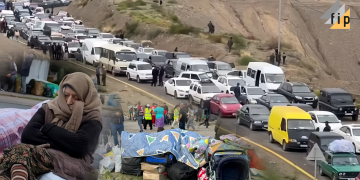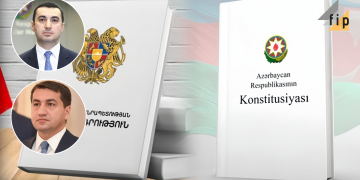During the May 22 press conference, Nikol Pashinyan stated: “[Azerbaijan’s] 86,600 sq. km also includes Nagorno-Karabakh.”
When the journalist asked to clarify whether the current government of Armenia is saying that Nagorno-Karabakh is part of Azerbaijan, Pashinyan replied: “No matter what the current government of Armenia says, all the governments of the Republic of Armenia have recognized the territorial integrity of Azerbaijan.”
The Fact Investigation Platform studied the positions of the former leaders of Armenia on Nagorno Karabakh and the territorial integrity of Azerbaijan to find out whether Pashinyan’s claim is true or false.
Levon Ter-Petrosyan
The Alma-Ata Declaration was signed during the tenure of the first president Levon Ter-Petrosyan. The document created in 1991 was ratified by the Supreme Council of Armenia with reservations.
In particular, one of the paragraphs stating “the parties shall recognize and respect each other’s territorial integrity and the inviolability of existing borders”, was edited as follows: “The High Contracting Parties shall recognize and respect the right of nations to free self-determination, each other’s territorial integrity and the inviolability of borders.”
During the 1996 OSCE Lisbon Summit, in which Armenia also participated, it was planned to adopt a declaration in which a separate section would be dedicated to Nagorno Karabakh. Accordingly, the resolution of the conflict was based on three principles: respecting the territorial integrity of Armenia and Azerbaijan, ensuring the highest degree of self-government for Nagorno-Karabakh within Azerbaijan, guaranteeing the safety of Nagorno-Karabakh and its population. Armenia exercised its right of veto, and that part was left out of the final text of the declaration.
In his speech, Levon Ter-Petrosyan stated that if the Karabakh issue is resolved on the basis of the principles proposed by Azerbaijan, the population of Nagorno Karabakh will face the constant threat of genocide or forced displacement.
“The experience of anti-Armenian pogroms in Sumgait (February 1988), Kirovabad (November 1988) and Baku (January 1990), as well as the deportation of the population of 24 Armenian villages in Karabakh (May-June 1991) clearly shows that Azerbaijan, despite all assurances, cannot provide security guarantees for the population of Nagorno Karabakh. Therefore, we are of the opinion that the only possibility to avoid a new tragedy is to respect the right to self-determination of the people of Nagorno-Karabakh,” he noted.
In January 2022, RFE/RL Armenia Service, referring to the Vice President of the Armenian National Congress, Levon Zurabyan, published Yerevan’s official response to the “package” option of the Karabakh conflict settlement presented by the co-chairs of the OSCE Minsk Group in 1997: “As is well known, Armenia cannot accept the principle of territorial integrity of Azerbaijan as a basis for settlement of the issue until Azerbaijan-Nagorno-Karabakh relations and the political status of Nagorno-Karabakh are clarified.”
And then he goes on to say: “As we mentioned above, Armenia cannot accept the principle of territorial integrity of Azerbaijan as a basis for settlement of the issue. Therefore, the first and second articles in the draft of the agreement (the article on territorial integrity and the one that says Karabakh is recognized as part of Azerbaijan) are not subject to discussion for Armenia,” the article of RFE/RL Armenia Service read.
Robert Kocharyan
During the tenure of the 2nd President Robert Kocharyan as well, Armenia did not recognize the territorial integrity of Azerbaijan, including the Nagorno Karabakh Republic.
Moreover, speaking at the PACE in 2004, Kocharyan stated that as a result of the collapse of the USSR, two independent states were formed in the territory of the former Azerbaijan SSR – the Republic of Nagorno Karabakh and the Republic of Azerbaijan. “The legal bases of the existence of those states are identical. In other words, the territorial integrity of Azerbaijan has nothing to do with the Republic of Nagorno Karabakh. And we are ready to discuss the issue of conflict settlement on a legal dimension.”
On October 7, 2005, during a meeting with the President of Latvia, Kocharyan stated that “we have our own territory, we have our borders, and Armenia has never been against the importance of the principle of territorial integrity, but that principle, in this case, the independence of Karabakh, has nothing to do with the territorial integrity of Azerbaijan”.
Serzh Sargsyan
The 3rd President of the Republic of Armenia, Serzh Sargsyan, repeatedly stated in his public speeches that Nagorno Karabakh will never be part of Azerbaijan. He has spoken about conceding the regions around Nagorno Karabakh, but Nagorno Karabakh was never recognized as part of Azerbaijan.
In an interview with Russian journalist Dmitry Kiselyov in 2016, Sargsyan said: “We accept the territorial integrity of any state, including Azerbaijan. But the self-determination of the people does not at all contradict the principle of territorial integrity, because territorial integrity refers to relations between states, and self-determination refers to the capital and the people who live in their historical homeland. If we ignore the people’s right to self-determination, then we should not have left the Soviet Union. After all, it happened on the basis of that principle. Therefore, these principles do not contradict each other.”
It should be noted that on May 14, the President of the European Council, Charles Michel, announced after meeting with Armenian Prime Minister Nikol Pashinyan and Azerbaijani President Ilham Aliyev in Brussels that Armenia and Azerbaijan have confirmed the mutual recognition of the territorial integrity of their countries based on the 1991 Almaty Declaration and have agreed to respect Armenia’s 29.8 thousand sq. km territory and Azerbaijan’s 86.6 thousand sq. km territory. It was the first time in the history of the Nagorno-Karabakh conflict negotiations that the territories of the republics were mentioned.
Thus, Pashinyan’s claim that all governments of the Republic of Armenia have recognized the territorial integrity of Azerbaijan, including Nagorno-Karabakh, is false and manipulative. The former presidents did not make such a claim either through signed documents or public statements.
Loosineh Voskanyan

 FACTOMETER
FACTOMETER










